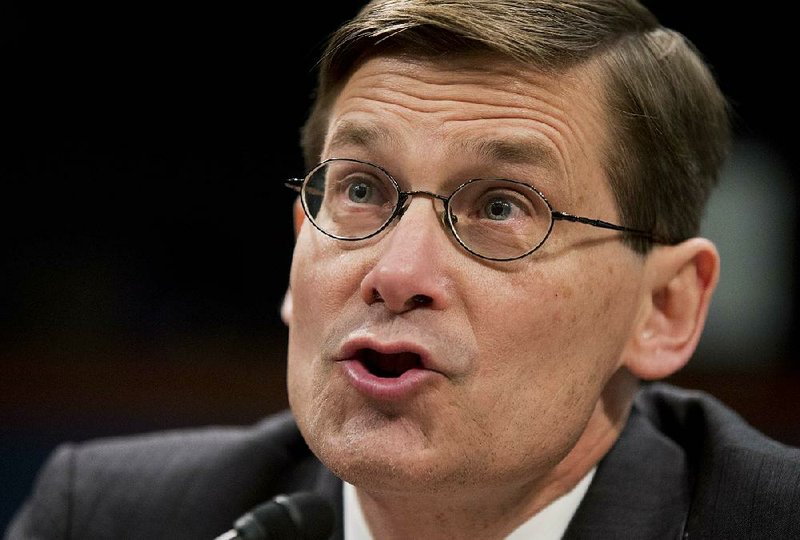WASHINGTON -- The former deputy director of the CIA asserts in a forthcoming book that Republicans, in their eagerness to politicize the killing of the U.S. ambassador to Libya, repeatedly distorted the agency's analysis of events. But he also argues that the CIA should get out of the business of providing "talking points" for administration officials in national security events that quickly become partisan, as happened after the Benghazi attack in 2012.
The official, Michael Morell, dismisses the allegation that the U.S. military and CIA officers "were ordered to stand down and not come to the rescue of their comrades," and says there is "no evidence" to support the charge that "there was a conspiracy between CIA and the White House to spin the Benghazi story in a way that would protect the political interests of the president and Secretary Clinton," referring to then-Secretary of State Hillary Rodham Clinton.
But he also concludes that the White House embellished some of the talking points provided by the CIA and had blocked him from sending an internal study of agency conclusions to Congress.
"I finally did so without asking," just before leaving government, he writes, and after the White House had released internal emails to a committee investigating the State Department's handling of the issue.
A lengthy congressional investigation remains underway, one that many Republicans hope to use against Clinton in the 2016 election cycle.
In parts of the book, The Great War of Our Time, Morell praises his CIA colleagues for many successes in stopping terrorist attacks, but is critical of other CIA failings -- and those of the National Security Agency.
Soon after Morell retired in 2013 after 33 years in the agency, President Barack Obama appointed him to a commission reviewing the actions of the National Security Agency after the disclosures of Edward Snowden, a former intelligence contractor who released classified documents about the government's eavesdropping abilities. Morell writes that he was surprised by what he found.
"You would have thought that of all the government entities on the planet, the one least vulnerable to such grand theft would have been the NSA," he writes. "But it turned out that the NSA had left itself vulnerable."
He concludes that most Wall Street firms had better cybersecurity than the NSA had when Snowden swept information from its systems in 2013. While he said he found himself "chagrined by how well the NSA was doing" compared with the CIA in stepping up its collection of data on intelligence targets, he also sensed that the NSA, which specializes in electronic spying, was operating without considering the implications of its methods.
"The NSA had largely been collecting information because it could, not necessarily in all cases because it should," he says.
The book is to be released next week.
Morell was a career analyst who rose through the ranks of the agency, and ended up in the No. 2 post. He served as President George W. Bush's personal intelligence briefer in the first months of his presidency.
His account of the Benghazi attacks -- and how the CIA was drawn into the debate over whether the Obama White House deliberately distorted its account of the death of Ambassador J. Christopher Stevens -- is bound to attract attention, at least partly because of its relevance to the coming presidential election.
The initial assessments the CIA gave to the White House said demonstrations had preceded the Benghazi attack. By the time analysts reversed their opinion, Susan Rice, now the national security adviser, had made a series of statements on Sunday talk shows describing the initial assessment.
The experience prompted Morell to write that the CIA should stay out of the business of preparing talking points -- especially on issues that are being seized upon for "political purposes." He is critical of the State Department for not beefing up security in Libya for its diplomats, as the CIA, he said, did for its employees.
But he concludes that the assault in which the ambassador was killed took place "with little or no advance planning," and "was not well organized." He says the attackers "did not appear to be looking for Americans to harm. They appeared intent on looting and conducting some vandalism," setting fires that killed Stevens and a security official, Sean Smith.
Morell paints a picture of an agency that was struggling, largely unsuccessfully, to understand dynamics in the Middle East and North Africa when the Arab Spring broke out in late 2011 in Tunisia. The agency's analysts failed to see the forces of revolution coming -- and then failed again, he writes, when they told Obama that the uprisings would undercut al-Qaida by showing there was a democratic pathway to change.
Moreover, an agency that has always overvalued secretly gathered intelligence and undervalued "open source" material "was not doing enough to mine the wealth of information available through social media," he writes. "We thought and told policymakers that this outburst of popular revolt would damage al-Qaida by undermining the group's narrative," he writes.
Instead, weak governments in Egypt, and the absence of governance from Libya to Yemen, were "a boon to Islamic extremists across both the Middle East and North Africa."
A Section on 05/05/2015

